Critical Theory
Critical Theory

Capital Is Dead: Is This Something Worse?
It's not capitalism, it's not neoliberalism - what if it's something worse?
In this radical and visionary new book, McKenzie Wark argues that information has empowered a new kind of ruling class. Through the ownership and control of information, this emergent class dominates not only labour but capital as traditionally understood as well. And it's not just tech companies like Amazon and Google. Even Walmart and Nike can now dominate the entire production chain through the ownership of not much more than brands, patents, copyrights, and logistical systems.
While techno-utopian apologists still celebrate these innovations as an improvement on capitalism, for workers, and the planet, it's worse. The new ruling class uses the powers of information to route around any obstacle labor and social movements put up. So how do we find a way out? Capital Is Dead offers not only the theoretical tools to analyze this new world, but ways to change it. Drawing on the writings of a surprising range of classic and contemporary theorists, Wark offers an illuminating overview of the contemporary condition and the emerging class forces that control, and contest it.

Symbiotic Planet: A New Look at Evolution
Although Charles Darwin's theory of evolution laid the foundations of modern biology, it did not tell the whole story. Most remarkably, The Origin of Species said very little about, of all things, the origins of species. Darwin and his modern successors have shown very convincingly how inherited variations are naturally selected, but they leave unanswered how variant organisms come to be in the first place.
In Symbiotic Planet, renowned scientist Lynn Margulis shows that symbiosis, which simply means members of different species living in physical contact with each other, is crucial to the origins of evolutionary novelty. Ranging from bacteria, the smallest kinds of life, to the largest, the living Earth itself, Margulis explains the symbiotic origins of many of evolution's most important innovations.
The very cells we're made of started as symbiotic unions of different kinds of bacteria. Sex, and its inevitable corollary, death, arose when failed attempts at cannibalism resulted in seasonally repeated mergers of some of our tiniest ancestors. Dry land became forested only after symbioses of algae and fungi evolved into plants. Since all living things are bathed by the same waters and atmosphere, all the inhabitants of Earth belong to a symbiotic union. Gaia, the finely tuned largest ecosystem of the Earth's surface, is just symbiosis as seen from space.
Along the way, Margulis describes her initiation into the world of science and the early steps in the present revolution in evolutionary biology; the importance of species classification for how we think about the living world; and the way academic apartheid can block scientific advancement. Written with enthusiasm and authority, this is a book that could change the way you view our living Earth.
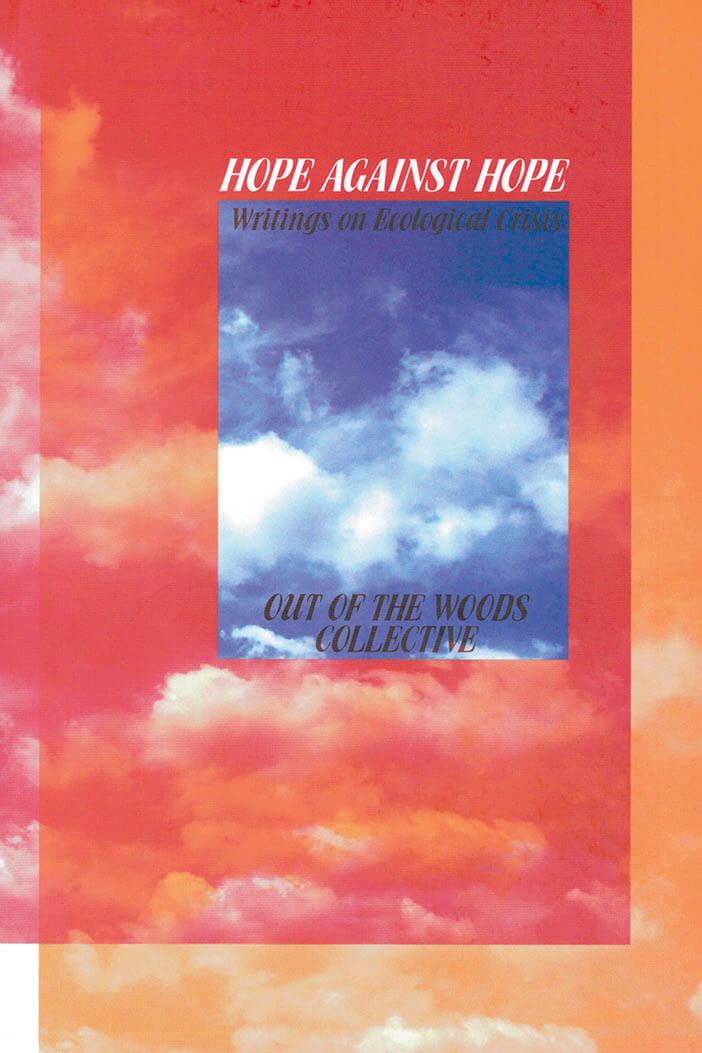
Hope Against Hope
In Hope Against Hope, the Out of the Woods collective investigates the critical relation between climate change and capitalism and calls for the expansion of our conceptual toolbox to organize within and against ecological crisis characterized by deepening inequality, rising far-right movements, and, relatedly, more frequent and devastating disasters. While much of environmentalist and leftist discourse in this political moment remain oriented toward horizons that repeat and renew racist, anti-migrant, nationalist, and capitalist assumptions, Out of the Woods charts a revolutionary course adequate to our times.
At the center of the renewed political orientation Hope Against Hope expounds is an abolitionist approach to border imperialism, reactionary ecology, and state violence that underpins many green solutions and modes of understanding nature. It reminds us of the frequent moments and movements of solidarity emerging in the ruins all around us. Their stunning conclusion to the disarray of politics in our seemingly end times is the urgency of creating what Out of the Woods calls "disaster communism", the collective power to transform our future political horizons from the ruins and establish a climate future based in common life.
Out of the Woods is a transnational political research and theory collective, a loose grouping of decolonial, small-c communist, antiracist queer-feminist thinkers working together to think through the problem of ecological crisis.
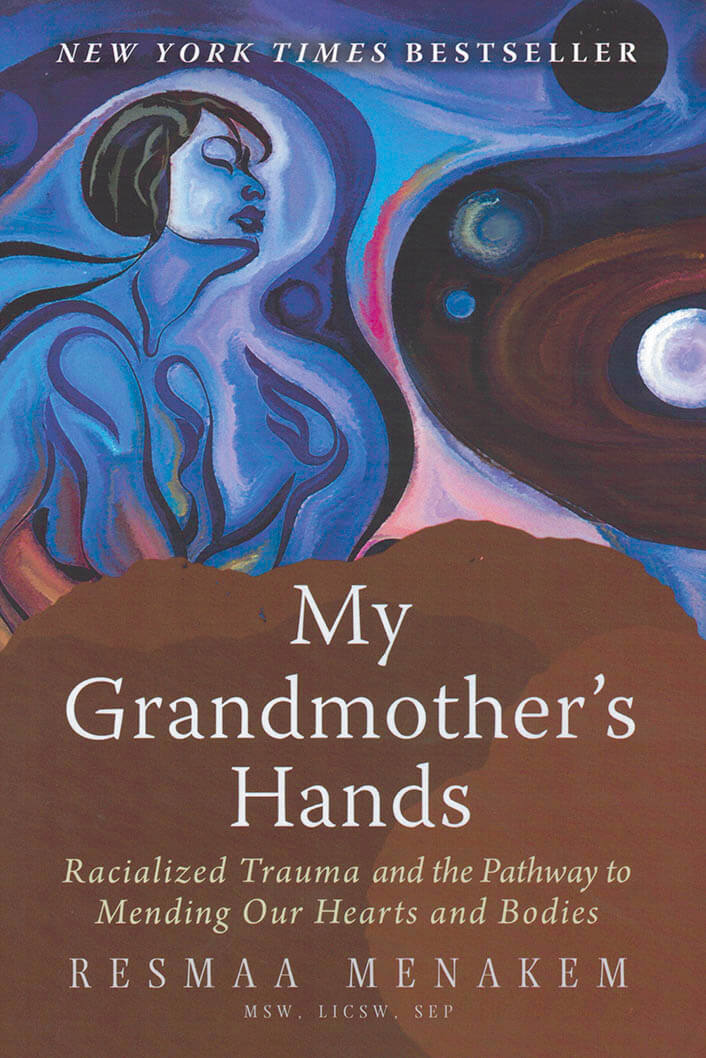
My Grandmother's Hands: Racialized Trauma and the Pathway to Mending Our Hearts and Bodies
Racism and trauma are addressed as the author examines white supremacy in America from the perspective of body-centered psychology.
The body is where our instincts reside and where we fight, flee, or freeze, and it endures the trauma inflicted by the ills that plague society. Menakem argues this destruction will continue until Americans learn to heal the generational anguish of white supremacy, which is deeply embedded in all our bodies. Our collective agony doesn't just affect African Americans. White Americans suffer their own secondary trauma as well. So do blue Americans — our police.

The Against Nature Journal #2
Grégory Castéra, Aimar Arriola
This second issue revolves around the theme of migration, a crucial topic when addressing the forced displacement of LGBTQ+ people from contexts where “nature” is still used to criminalize consensual same-sex conduct or gender expression.
"We are honored to publish a new short essay by JASBIR K. PUAR that updates her work on homonationalism. In an interview with Indian activist ALOK HISARWALA GUPTA, we speak of how laws also cross borders, while legal researcher WARUGURU GAITHO and activist CARL COLLISON offer different approaches to report- ing on claims for asylum. FATIMA EL-TAYEB’s vibrant essay invites us to consider the meaning of a queer “we,” while iconic writer and filmmaker ABDELLAH TAÏA tackles everyday xenophobia in France. Poetry by GLORIA ANZALDÚA and DIVYA VICTOR offer personal reflections of homelessness and alienation, which resonate with the special visual contribution by artist ZOE LEONARD, whose photographs focus on the quotidian movements of crossing the river border between the US and Mexico. Historian ZEB TORTORICI addresses the notion of “against nature” through an engagement with the archive, while our Columns section brings news from Brazil, India, Kenya, Lebanon, Morocco, and the UK, in a season marked by the Covid-19 pandemic." — the editors

Mutual Aid
Mutual aid is the radical act of caring for each other while working to change the world.
Around the globe, people are faced with a spiralling succession of crises, from the Covid-19 pandemic and climate change-induced fires, floods, and storms to the ongoing horrors of mass incarceration, racist policing, brutal immigration enforcement, endemic gender violence, and severe wealth inequality. As governments fail to respond to—or actively engineer—each crisis, ordinary people are finding bold and innovative ways to share resources and support the vulnerable.
Survival work, when done alongside social movement demands for transformative change, is called mutual aid.
This book is about mutual aid: why it is so important, what it looks like, and how to do it. It provides a grassroots theory of mutual aid, describes how mutual aid is a crucial part of powerful movements for social justice, and offers concrete tools for organizing, such as how to work in groups, how to foster a collective decision-making process, how to prevent and address conflict, and how to deal with burnout.
Writing for those new to activism as well as those who have been in social movements for a long time, Dean Spade draws on years of organizing to offer a radical vision of community mobilization, social transformation, compassionate activism, and solidarity.

If They Come in the Morning...
One of America's most historic political trials is undoubtedly that of Angela Davis. Opening with a letter from James Baldwin to Davis, and including contributions from numerous radicals such as Black Panthers George Jackson, Huey P. Newton, Bobby Seale and Erica Huggins, this book is not only an account of Davis's incarceration and the struggles surrounding it, but also perhaps the most comprehensive and thorough analysis of the prison system of the United State.
Since the book was written, the carceral system in the US has seen unprecedented growth, with more of America's black population behind bars than ever before. The scathing analysis of the role of prison and the policing of black populations offered by Davis and her comrades in this astonishing volume remains as pertinent today as the day it was first published.
Featuring contributions from George Jackson, Bettina Aptheker, Bobby Seale, James Baldwin, Ruchell Magee, Julian Bond, Huey P. Newton, Erika Huggins, Fleeta Drumgo, John Clutchette, and others.

Blackspace: On the Poetics of an Afrofuture
Black artists of the avant-garde have always defined the future.
Blackspace: On the Poetics of an Afrofuture is the culmination of six years of multidisciplinary research by trans poet and curator Anaïs Duplan about the aesthetic strategies used by experimental artists of color since the 1960s to pursue liberatory possibility. Through a series of lyric essays, interviews with contemporary artists and writers of color, and ekphrastic poetry, Duplan deconstructs how creative people frame their relationships to the word, "liberation." With a focus on creatives who use digital media and language-as-technology, luminaries like Actress, Juliana Huxtable, Lawrence Andrews, Tony Cokes, Sondra Perry, and Nathaniel Mackey, Duplan offers three lenses for thinking about liberation: the personal, the social, and the existential. Arguing that true freedom is impossible without considering all three, the book culminates with a personal essay meditating on the author's own journey of gender transition while writing the book.
Anaïs Duplan is a trans* poet, curator, and artist. He is the founding curator for the Center for Afrofuturist Studies, an artist residency program for artists of color, based in Iowa City. He has worked as an adjunct poetry professor at the University of Iowa, Columbia University, Sarah Lawrence, and St. Joseph's College. He was a 2017-2019 joint Public Programs Fellow at the Museum of Modern Art and the Studio Museum in Harlem.
Published Oct 2020

Columbia Books on Architecture and the City
Paths to Prison: On the Architectures of Carcerality
As Angela Y. Davis has proposed, the "path to prison," which so disproportionately affects communities of color, is most acutely guided by the conditions of daily life. Architecture, then, as fundamental to shaping these conditions of civil existence, must be interrogated for its involvement along this diffuse and mobile path. Paths to Prison: On the Architectures of Carcerality aims to expand the ways the built environment's relationship to and participation in the carceral state is understood in architecture. The collected essays in this book implicate architecture in the more longstanding and pervasive legacies of racialized coercion in the United States—and follow the premise that to understand how the prison enacts its violence in the present one must shift the epistemological frame elsewhere: to places, discourses, and narratives assumed to be outside of the sphere of incarceration.
Paths to Prison: On the Architectures of Carcerality offers not a fixed or inexorable account of how things are but rather a set of starting points and methodologies for reevaluating the architecture of carceral society and for undoing it altogether.
With contributions by Adrienne Brown, Stephen Dillon, Jarrett M. Drake, Sable Elyse Smith, James Graham, Leslie Lodwick, Dylan Rodríguez, Anne Spice, Brett Story, Jasmine Syedullah, Mabel O. Wilson, and Wendy L. Wright.
Published September 2020

More-than-Human
Lucia Pietroiusti, Marina Otero Verzier and 1 more
The More-than-Human reader brings together texts that reflect on the state of post-anthropocentric thinking today, by writers from a wide range of disciplines. Focusing on the ecologies and technologies of climate injustice and inequalities, as well as the destructive structures lurking within anthropocentrism, More-than-Human proposes complex entanglements, frictions, and reparative attention across species and beings.
Thinking past the centrality of the human subject, the texts that compose this reader begin to imagine networks of ethics and responsibility emerging not from the ideologies of old, but from the messy and complex liveliness around and beneath us.
Rather than attempting to be a comprehensive compendium on the topic (which would be virtually impossible), More-than-Human provides a cross-section of the breadth and vitality of a literary, scientific, and conceptual milieu where multiple strands of work intersect even as they are frequently regarded as belonging to separate disciplinary discourses.
Contributors: Stacy Alaimo, Ramon Amaro, Karen Barad, Rosi Braidotti, Octavia Butler, Georges Canguilhem, Marisol de la Cadena, NASA History Department, Silvia Federici, Scott F. Gilbert, Édouard Glissant, Jack Halberstam, Donna Haraway, Myra J. Hird, Kristina Lyons, Patricia MacCormack, John T. Maher, Michael Marder, Timothy Mitchell, Reza Negarastani, Jussi Parikka, Elizabeth Povinelli, Paul B. Preciado, María Puig de la Bellacasa, Filipa Ramos, Isabelle Stengers, Elly R. Truitt, Anna L. Tsing, Eduardo Vivieros de Castro, Jason Wallin, Kathryn Yusoff and Joanna Zylinska.
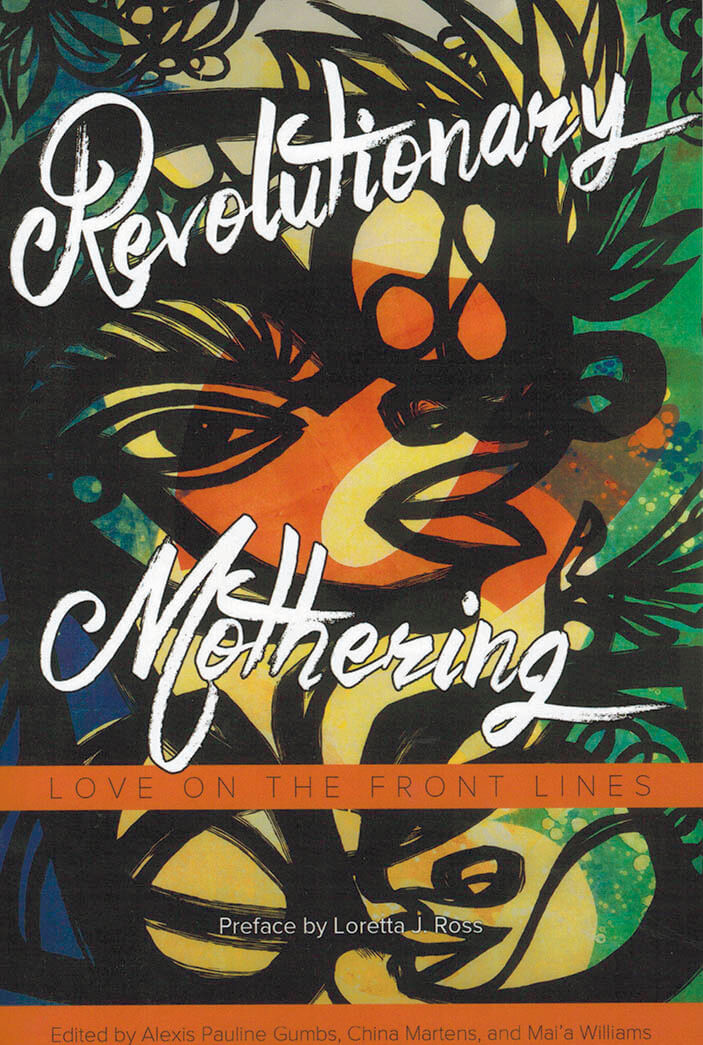
Revolutionary Mothering: Love on the Front Lines
Mai'a Williams, China Martens and 1 more
Revolutionary Mothering: Love on the Frontlines is an anthology that centers mothers of color and marginalized mothers' voices, women who are in a world of necessary transformation. The challenges faced by movements working for antiviolence, anti-imperialist, and queer liberation, as well as racial, economic, reproductive, gender, and food justice are the same challenges that marginalized mothers face every day.
Motivated to create spaces for this discourse because of the authors' passionate belief in the power of a radical conversation about mothering, they have become the go-to people for cutting-edge inspired work on this topic for an overlapping committed audience of activists, scholars, and writers. Revolutionary Mothering is a movement-shifting anthology committed to birthing new worlds, full of faith and hope for what we can raise up together.
Contributors include alba onofrio, Alexis Pauline Gumbs, Ariel Gore, Arielle Julia Brown, Autumn Brown, Cheryl Boyce-Taylor, China Martens, Christy NaMee Eriksen, Claire Barrera, Cynthia Dewi Oka, Esteli Juarez Boyd, Fabielle Georges, Fabiola Sandoval, Gabriela Sandoval, H. Bindy K. Kang, Irene Lara, June Jordan, Karen Su, Katie Kaput, Layne Russell, Lindsey Campbell, Lisa Factora-Borchers, Loretta J. Ross, Mai'a Williams, Malkia A. Cyril, Mamas of Color Rising, Micaela Cadena, Noemi Martinez, Norma A. Marrun, Panquetzani, Rachel Broadwater, Sumayyah Talibah, Tara CC Villaba, Terri Nilliasca, tk karakashian tunchez, Victoria Law, and Vivian Chin.

Postcapitalist Desire: The Final Lectures
A collection of transcripts from Mark Fisher’s final series of lectures at Goldsmiths, University of London, in late 2016.
Edited and with an introduction by Matt Colquhoun, this collection of lecture notes and transcriptions reveals acclaimed writer and blogger Mark Fisher in his element — the classroom — outlining a project that Fisher’s death left so bittersweetly unfinished.
Beginning with that most fundamental of questions — “Do we really want what we say we want?” — Fisher explores the relationship between desire and capitalism, and wonders what new forms of desire we might still excavate from the past, present, and future. From the emergence and failure of the counterculture in the 1970s to the continued development of his left-accelerationist line of thinking, this volume charts a tragically interrupted course for thinking about the raising of a new kind of consciousness, and the cultural and political implications of doing so.
For Fisher, this process of consciousness raising was always, fundamentally, psychedelic — just not in the way that we might think…
Edited by Matt Colquhoun
Published 2021
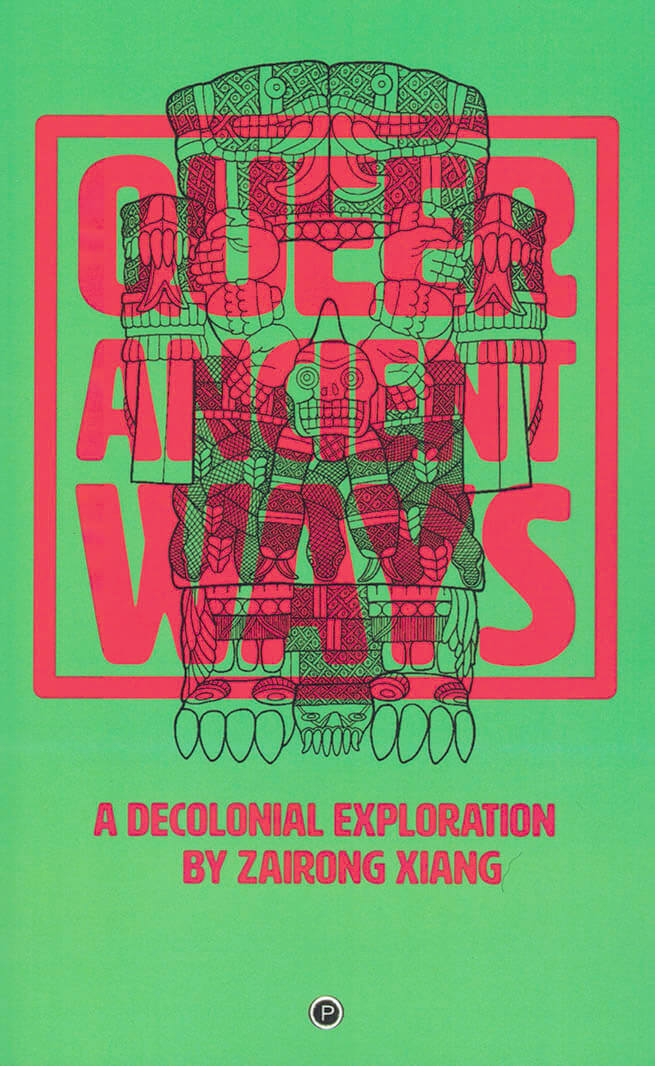
Queer Ancient Ways: A Decolonial Exploration
Queer Ancient Ways advocates a profound unlearning of colonial/modern categories as a pathway to the discovery of new forms and theories of queerness in the most ancient of sources. In this radically unconventional work, Zairong Xiang investigates scholarly receptions of mythological figures in Babylonian and Nahua creation myths, exposing the ways they have consistently been gendered as feminine in a manner that is not supported, and in some cases actively discouraged, by the texts themselves.
An exercise in decolonial learning-to-learn from non-Western and non-modern cosmologies, Xiang's work uncovers a rich queer imaginary that had been all-but-lost to modern thought, in the process critically revealing the operations of modern/colonial systems of gender/sexuality and knowledge-formation that have functioned, from the Conquista de America in the sixteenth century to the present, to keep these systems in obscurity.
At the heart of Xiang's argument is an account of the way the unfounded feminization of figures such as the Babylonian (co)creatrix Tiamat, and the Nahua creator-figures Tlaltecuhtli and Coatlicue, is complicit with their monstrification. This complicity tells us less about the mythologies themselves than about the dualistic system of gender and sexuality within which they have been studied, underpinned by a consistent tendency in modern/colonial thought to insist on unbridgeable categorical differences.
By contextualizing these deities in their respective mythological, linguistic, and cultural environments, through a unique combination of methodologies and critical traditions in English, Spanish, French, Chinese, and Nahuatl, Xiang departs from the over-reliance of much contemporary queer theory on European (post)modern thought. Much more than a queering of the non-Western and non-modern, Queer Ancient Ways thus constitutes a decolonial and transdisciplinary engagement with ancient cosmologies and ways of thought which are in the process themselves revealed as theoretical sources of and for the queer imagination.

Desire/Love
In this small theoretical novella-cum-dictionary entry, Lauren Berlant engages love and desire in separate entries. In the first entry, Desire mainly describes the feeling one person has for something else: it is organized by psychoanalytic accounts of attachment, and tells briefly the history of their importance in critical theory and practice. The second entry, on Love, begins with an excursion into fantasy, moving away from the parent-child structure so central to psychoanalysis and looking instead at the centrality of context, environment, and history. The entry on Love describes some workings of romance across personal life and commodity culture, the place where subjects start to think about fantasy on behalf of their actual lives.
Whether viewed psychoanalytically, institutionally, or ideologically, love is deemed always an outcome of fantasy. Without fantasy, there would be no love. Desire/Love takes us on a tour of all of the things that sentence might mean.
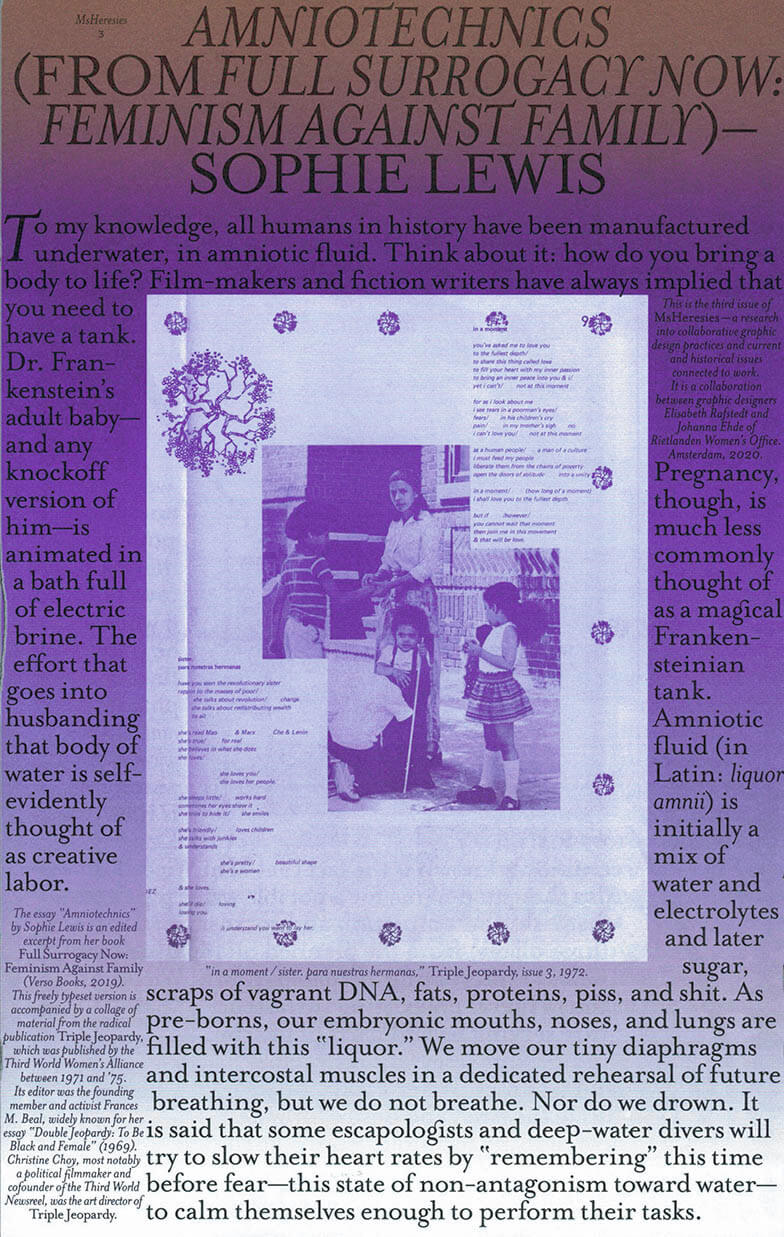
MsHERESIES 3 — AMNIOTECHNICS
Johanna Ehde, Elisabeth Rafstedt
Dedicated to the incredible – and incredibly beautiful – publication Triple Jeopardy (1971–75, by the Third World Women’s Alliance), as well as the ideas in Sophie Lewis’s book Full Surrogacy Now! – Feminism Against Family (Verso, 2019). Ms Heresies 3 is reprinting the book’s final chapter, the essay *Amniotechnics.*
Each spread weaves edited material from Triple Jeopardy with Sophie Lewis’s essay. These intuitive and meticulous compositions are the outcome of looking at Triple Jeopardy through the lens of collaborative graphic design. Reading, typesetting, collaging, painting, and ornamenting became a way of designing together while attempting an homage, a re-reading, and a cross-publication friendship.
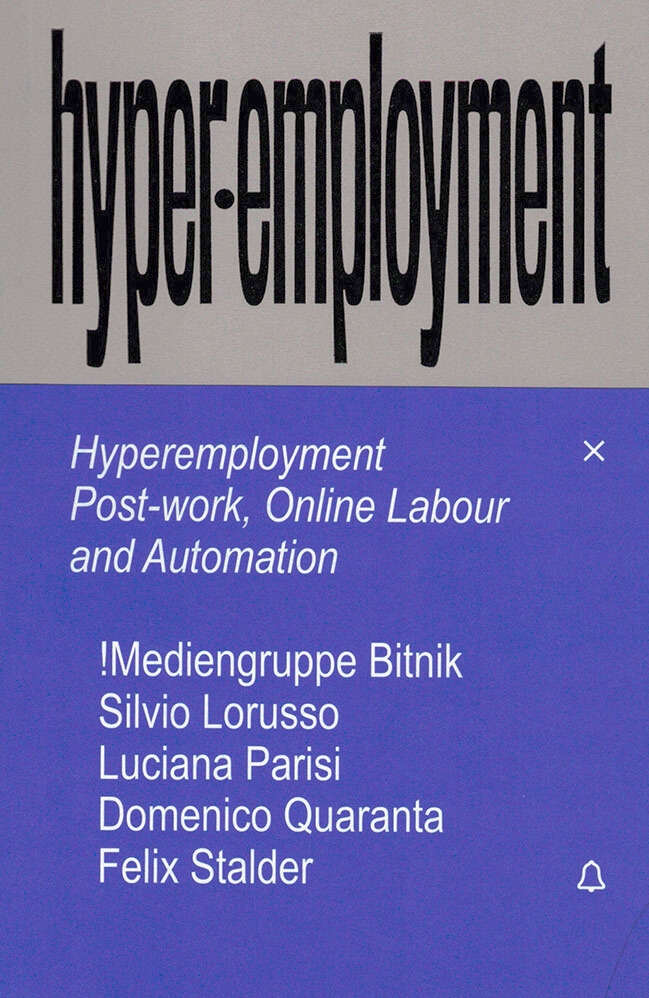
hyper-employment
Domenico Quaranta, Janez Janša
Hyperemployment – Post-work, Online Labour and Automation is an attempt to scrutinise and explore some of these issues. A catchphrase borrowed from media theorist Ian Bogost, describing “the Exhausting Work of the Technology User,” hyperemployment allows us to grasp a situation which the current pandemic has turned endemic, to analyse the present and discuss possible futures.
Edited by Domenico Quaranta and Janez Janša, featuring words by !Mediengruppe Bitnik (Carmen Weisskopf and Domagoj Smoljo) and Felix Stalder, Silvio Lorusso, Luciana Parisi, and Domenico Quaranta and works by !Mediengruppe Bitnik, Danilo Correale, Elisa Giardina Papa, Sanela Jahić, Silvio Lorusso, Jonas Lund, Michael Mandiberg, Eva and Franco Mattes, Anna Ridler, Sebastian Schmieg, Sašo Sedlaček, and Guido Segni.
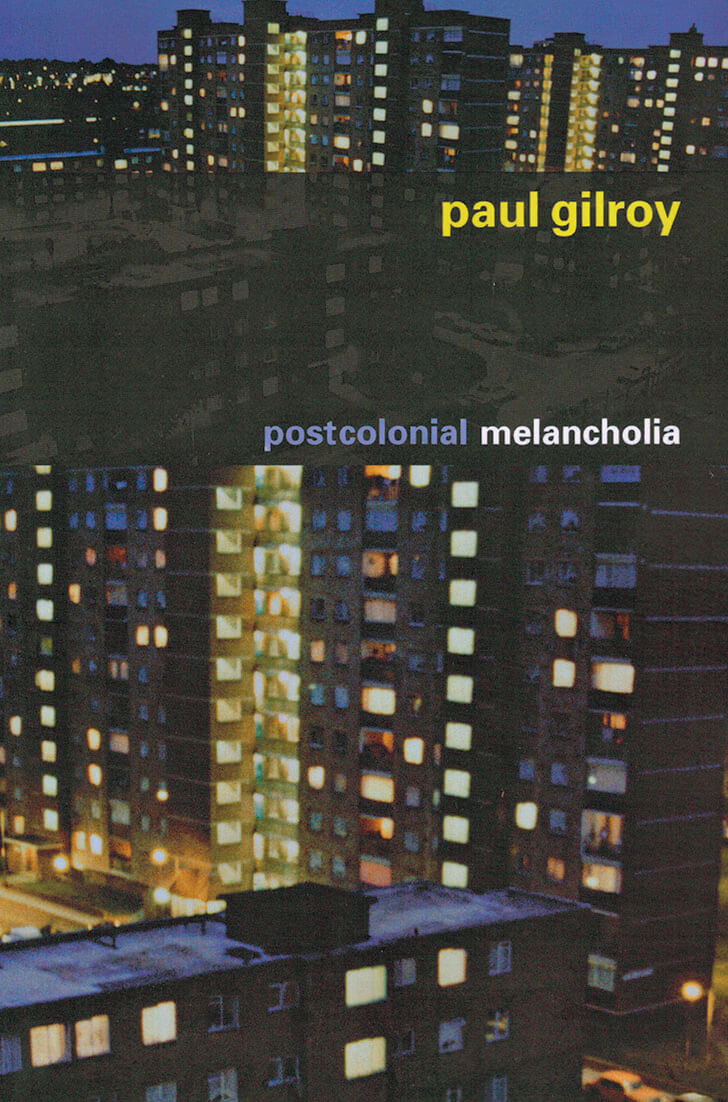
postcolonial melancholia
In Postcolonial Melancholia, Paul Gilroy continues the conversation he began in his landmark study of race and nation, 'There Ain't No Black in the Union Jack, ' by once again departing from conventional wisdom to examine-and defend-multiculturalism within the context of a post-9/11 "politics of security."
Gilroy adapts the concept of melancholia from its Freudian origins and applies it to the social pathology of neoimperialist politics. His unorthodox analysis pinpoints melancholic reactions not only in the hostility and violence directed at blacks, immigrants, and aliens but also in an inability to value the ordinary, unruly multiculture that has evolved organically and unnoticed in urban centers.
Drawing on seminal discussions of race by Frantz Fanon, W. E. B. DuBois, and George Orwell, Gilroy goes beyond the idea of mere tolerance and proposes that it is possible to celebrate multiculture and live with otherness without becoming anxious, fearful, or violent.

Witches, Witch-Hunting and Women
The world is witnessing a new surge of interpersonal and institutional violence against women, including new witch hunts. This surge of violence has occurred alongside an expansion of capitalist social relation. In this new work, Silvia Federici examines the root causes of these developments and outlines the consequences for the women affected and their communities. She argues, that this new war on women, a mirror of witch hunts in 16th- and 17th-century Europe and the "New World," is a structural element of the new forms of capitalist accumulation. These processes are founded on the destruction of people's most basic means of reproduction. Like at the dawn of capitalism, the factors behind today's violence against women are processes of enclosure, land dispossession, and the remolding of women's reproductive activities and subjectivity.
Silvia Federici is a feminist writer, teacher, and militant. In 1972 she was co-founder of the International Feminist Collective that launched the campaign for Wages for Housework internationally. Her previous books include Caliban and the Witch and Revolution at Point Zero. She is a professor emerita at Hofstra University, where she was a social science professor.
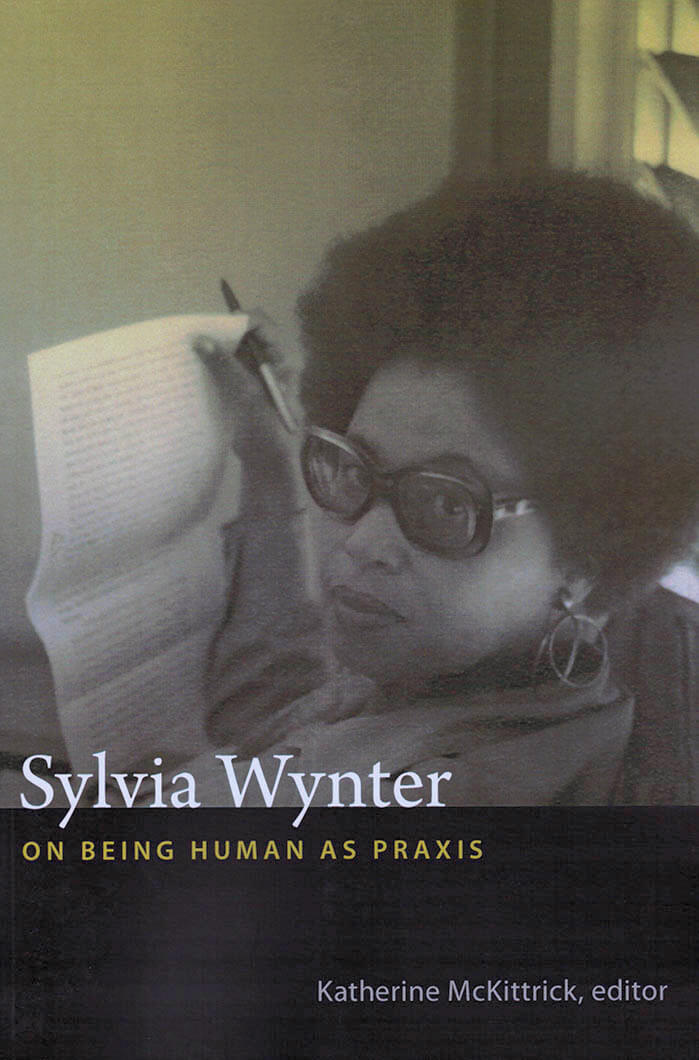
On Being Human as Praxis
The Jamaican writer and cultural theorist Sylvia Wynter is best known for her diverse writings that pull together insights from theories in history, literature, science, and black studies, to explore race, the legacy of colonialism, and representations of humanness.
Sylvia Wynter: On Being Human as Praxis is a critical genealogy of Wynter’s work, highlighting her insights on how race, location, and time together inform what it means to be human. The contributors explore Wynter’s stunning reconceptualization of the human in relation to concepts of blackness, modernity, urban space, the Caribbean, science studies, migratory politics, and the interconnectedness of creative and theoretical resistances.
The collection includes an extensive conversation between Sylvia Wynter and Katherine McKittrick that delineates Wynter’s engagement with writers such as Frantz Fanon, W. E. B. DuBois, and Aimé Césaire, among others; the interview also reveals the ever-extending range and power of Wynter’s intellectual project, and elucidates her attempts to rehistoricize humanness as praxis.

Habeas Viscus
Habeas Viscus focuses attention on the centrality of race to notions of the human. Alexander G. Weheliye develops a theory of "racializing assemblages," taking race as a set of sociopolitical processes that discipline humanity into full humans, not-quite-humans, and nonhumans. This disciplining, while not biological per se, frequently depends on anchoring political hierarchies in human flesh. The work of the black feminist scholars Hortense Spillers and Sylvia Wynter is vital to Weheliye's argument.
Particularly significant are their contributions to the intellectual project of black studies vis-à-vis racialization and the category of the human in western modernity. Wynter and Spillers configure black studies as an endeavor to disrupt the governing conception of humanity as synonymous with white, western man. Weheliye posits black feminist theories of modern humanity as useful correctives to the "bare life and biopolitics discourse" exemplified by the works of Giorgio Agamben and Michel Foucault, which, Weheliye contends, vastly underestimate the conceptual and political significance of race in constructions of the human. Habeas Viscus reveals the pressing need to make the insights of black studies and black feminism foundational to the study of modern humanity.
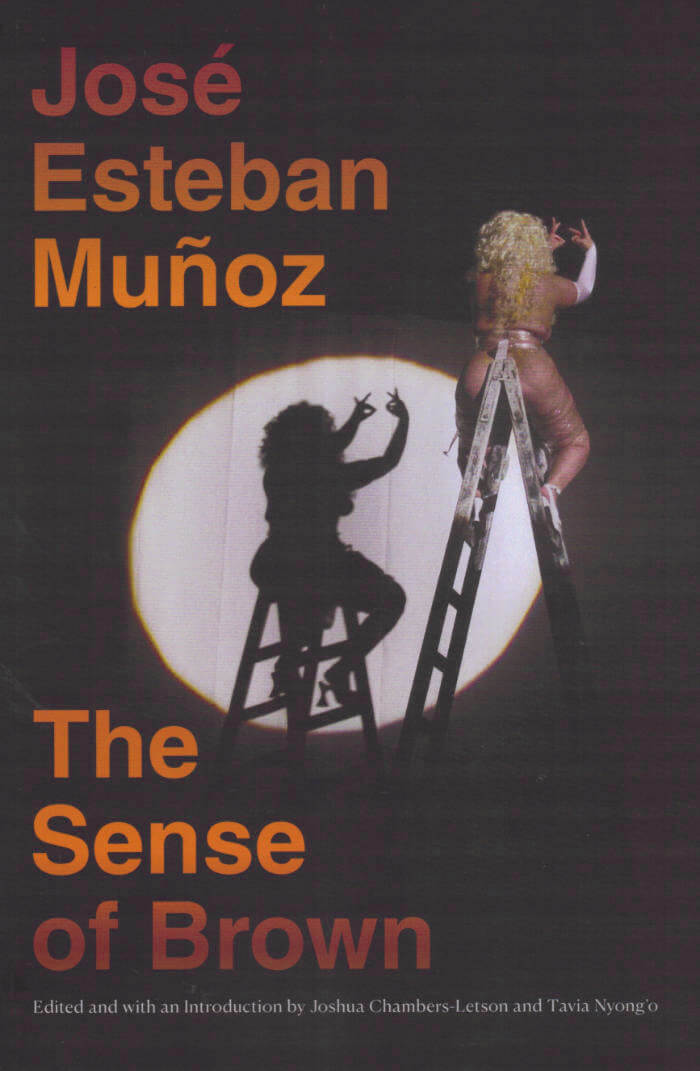
The Sense of Brown
The Sense of Brown is José Esteban Muñoz's treatise on brownness and being as well as his most direct address to queer Latinx studies. In this book, which he was completing at the time of his death, Muñoz examines the work of playwrights Ricardo Bracho and Nilo Cruz, artists Nao Bustamante, Isaac Julien, and Tania Bruguera, and singer José Feliciano, among others, arguing for a sense of brownness that is not fixed within the racial and national contours of Latinidad.
This sense of brown is not about the individualized brown subject; rather, it demonstrates that for brown peoples, being exists within what Muñoz calls the brown commons—a lifeworld, queer ecology, and form of collectivity. In analyzing minoritarian affect, ethnicity as a structure of feeling, and brown feelings as they emerge in, through, and beside art and performance, Muñoz illustrates how the sense of brown serves as the basis for other ways of knowing and being in the world.
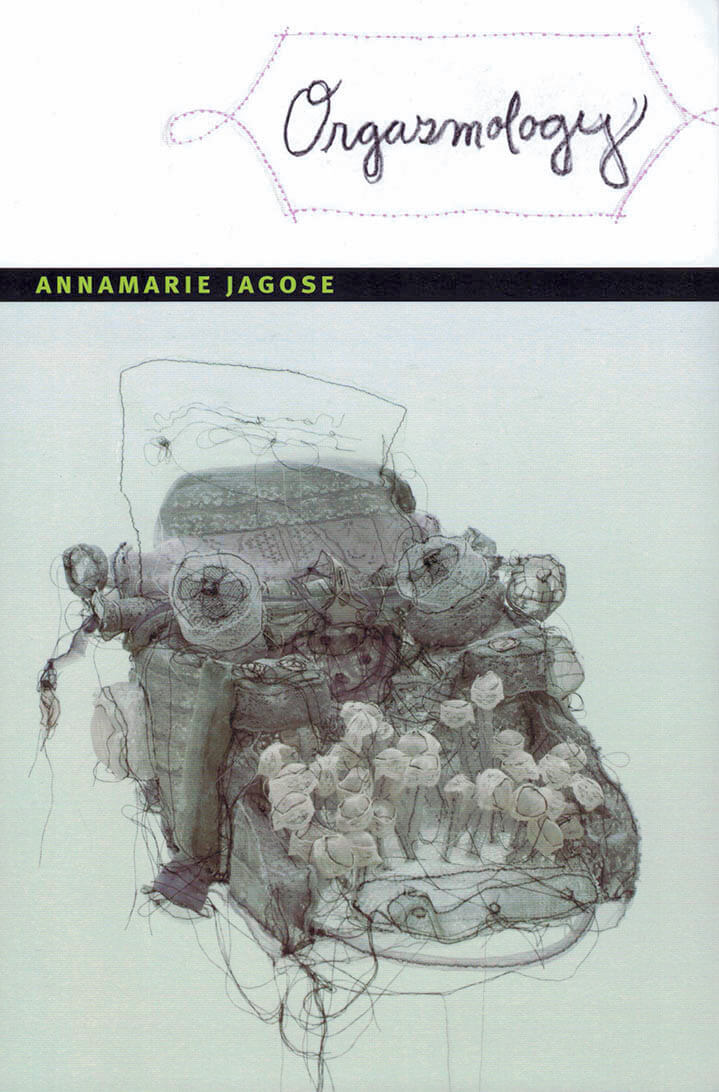
Orgasmology
For all its vaunted attention to sexuality, queer theory has had relatively little to say about sex, the material and psychic practices through which erotic gratification is sought. In Orgasmology, Annamarie Jagose takes orgasm as her queer scholarly object. From simultaneous to fake orgasms, from medical imaging to pornographic visualization, from impersonal sexual publics to domestic erotic intimacies, Jagose traces the career of orgasm across the twentieth century.
Along the way, she examines marriage manuals of the 1920s and 1930s, designed to teach heterosexual couples how to achieve simultaneous orgasms; provides a queer reading of behavioral modification practices of the 1960s and 1970s, aimed at transforming gay men into heterosexuals; and demonstrates how representations of orgasm have shaped ideas about sexuality and sexual identity.
A confident and often counterintuitive engagement with feminist and queer traditions of critical thought, Orgasmology affords fresh perspectives on not just sex, sexual orientation, and histories of sexuality, but also agency, ethics, intimacy, modernity, selfhood, and sociality. As modern subjects, we presume we already know everything there is to know about orgasm. This elegantly argued book suggests that orgasm still has plenty to teach us.

Reading Sedgwick
Over the course of her long career, Eve Kosofsky Sedgwick became one of the most important voices in queer theory, and her calls for reparative criticism and reading practices grounded in affect and performance have transformed understandings of affect, intimacy, politics, and identity. With marked tenderness, the contributors to Reading Sedgwick reflect on Sedgwick's many critical inventions, from her elucidation of poetry's close relation to criticism and development of new versions of queer performativity to highlighting the power of writing to engender new forms of life. As the essays in Reading Sedgwick demonstrate, Sedgwick's work is not only an ongoing vital force in queer theory and affect theory; it can help us build a more positive world in the midst of the bleak contemporary moment.
Contributors. Lauren Berlant, Kathryn Bond Stockton, Judith Butler, Lee Edelman, Jason Edwards, Ramzi Fawaz, Denis Flannery, Jane Gallop, Jonathan Goldberg, Meridith Kruse, Michael Moon, José Esteban Muñoz, Chris Nealon, Andrew Parker, H. A. Sedgwick, Karin Sellberg, Michael D. Snediker, Melissa Solomon, Robyn Wiegman
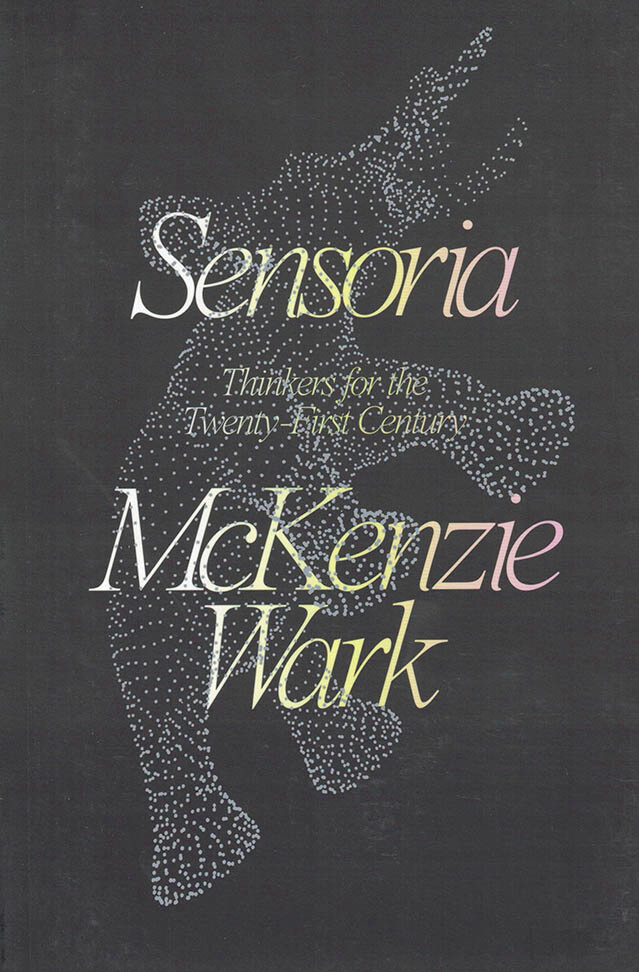
Sensoria
As we face the compounded crises of late capitalism, environmental catastrophe and technological transformation, who are the thinkers and the ideas who will allow us to understand the world we live in? McKenzie Wark surveys three areas at the cutting edge of current critical thinking: design, environment, technology and introduces us to the thinking of nineteen major writers. Each chapter is a concise account of an individual thinker, providing useful context and connections to the work of the others.
The authors include: Sianne Ngai, Kodwo Eshun, Lisa Nakamura, Hito Steyerl, Yves Citton, Randy Martin, Jackie Wang, Anna Lowenhaupt Tsing, Achille Mbembe, Deborah Danowich and Eduardo Viveiros de Castro, Eyal Weizman, Cory Doctorow, Benjamin Bratton, Tiziana Terranova, Keller Easterling, Jussi Parikka.
Wark argues that we are too often told that expertise is obtained by specialisation. Sensoria connects the themes and arguments across intellectual silos. They explore the edges of disciplines to show how we might know the world: through the study of culture, the different notions of how we create such things, and the impact that the machines that we devise have had upon us. The book is a vital and timely introduction to the future both as a warning but also as a road map on how we might find our way out of the current crisis.
McKenzie Wark is the author of Capital is Dead, General Intellects and Molecular Red among other books. She teaches at the New School for Social Research and Eugene Lang College in New York City.